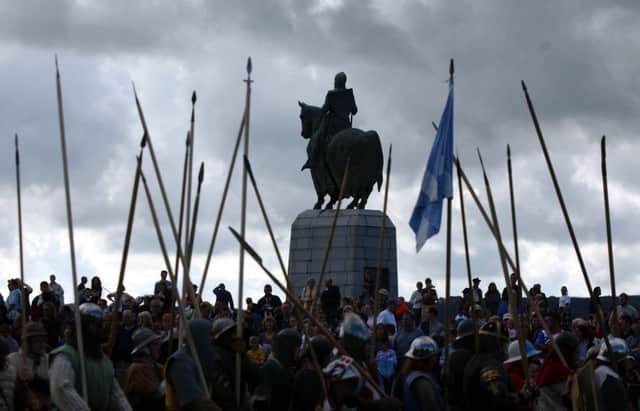Bannockburn named UK’s most decisive battle - poll


The conflict, which saw Robert the Bruce defeat Edward II in just two days, is a major landmark in Scottish history and a major milestone in the First War of Scottish Independence.
The BBC poll saw nearly a third of 60,000 votes cast in favour of the battle, which took place just outside Stirling in 1314.
Advertisement
Hide AdAdvertisement
Hide AdThe Battle of Britain, which is celebrating its 75th anniversary this year, came in second place, with 23 per cent of the votes. Meanwhile, Hastings, where King Harold and Duke William of Normandy battled it out for the throne of England in 1066, won 19 per cent of the votes cast.
Professor Michael Brown, from the University of St Andrews’s School of History, described the historic battle as a “potent symbol of Scotland’s place amongst the peoples of Europe”.
In his submission for the vote, he said: “Robert’s victory meant not just the continuation of the Scottish kingdom but that Scotland would develop separately from the rest of the island for the next 400 years, maintaining and pursuing its own course in terms of government, law, religion and relations with the peoples of Europe.”
He added: “Like other countries more used to defeat against their larger neighbours, Bannockburn has retained a central significance as proof of Scotland’s right to exist. In this way, the battle south of Stirling in 1314 did not simply help shape the past relationships between states, it will continue to exert an influence on the future of these islands.”
The Battle of Bannockburn was the culmination of centruries of conflict between the English and Scottish kingdoms. However, the aggressive Edward I – known as the “Hammer of the Scots” – had pushed the southern realm to a likely victory. But Robert the Bruce led a fierce resistance and forced Edward II, a less imposing king, to march a huge army to a marshy field in Stirlingshire, where he was victorious.
Scott McMaster, manager of the Bannockburn Experience for the National Trust for Scotland, said: “It is fantastic that after 700 years this event is still commemorated and remembered.
“It is the classic tale of the underdog, the smaller army defeating the elite force, and this result clearly shows the mark it has left on the Scottish psyche.”
The Bannockburn Experience, which opened in February 2014, welcomed more than 65,000 visitors in its first year after opening.
Advertisement
Hide AdAdvertisement
Hide AdThe tourist attraction features interactive exhibits using 3D technology – funded with £5 million from the Scottish Government and £4.1m from the Heritage Lottery Fund. A previous centre on the same site, which was built in the 1960s, attracted about 25,000 visitors a year.
Other battles which were shortlisted for the BBC poll included Brunanburh – described by historian Professor Michael Livingston as “the most important battle in English history that you’ve never heard of”; Boudica’s revolt in 61 AD and the Battle of Bosworth between Richard III and Henry Tudor in 1485. Also shortlisted were the Battle of Naseby, which took place during the English Civil War and the Battle of the Boyne in Ireland in 1690.